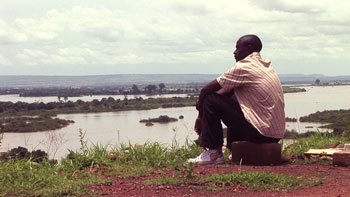Film programme on Migration during Leiden International Film Festival with LeidenGlobal

Still from Tout à refaire (2007).
In collaboration with the Leiden International Film Festival (LIFF), LeidenGlobal organized a film event at the National Museum of Ethnology on 4 November when several short films from Africa and Central America were screened, all centered around the theme of migration.
Almost 20 years ago, Arjun Appadurai was already writing about the relationship between imagination, mass media and migration, especially in relation to Africa. According to filmmaker Abderrahmane Sissako, who was born in Mali but grew up in Mauritania and now works in France, ‘One of the dramas of Africa is that its people are rarely confronted by its own image. Turning on the television there means only seeing Europe and the Western world. From this state of things results an acculturation, the new arms of a dominant society.’ This appears in the press notes for his 2002 film Heremakono/Waiting for Happiness. The film shows a longing for Europe among (West) Africans who have been brought up surrounded by the French language and culture; but this often turns into an extended period of waiting for something that may never come, because while images can easily transcend boundaries, people clearly cannot. The reality of globalization is that it has undeniably increased the division between the ‘haves’ and ‘have nots’, and has led to greater restrictions on movement and travel among those from the global South. However, since independence in the early 1960s, African filmmakers have been making films about migration and people wanting to escape poor economic conditions and find a better world. One of the first of these films was Black Girl (1966) by Africa's famous filmmaker Ousmane Sembène from Senegal.
For the LeidenGlobal film event, I selected and introduced two short feature films from the African Studies Centre’s film collection. The first tackled the  subject of 'return migration' with young people being sent 'home' to a country they have never set foot in before. Tout à refaire (2007), by the female Malian filmmaker Sadio Doucouré and French director Jérôme Polidor, is about 18-year-old Mamad who lives illegally in Paris with his family and who is deported to Bamako following a routine police check. The second film was from North Africa and deals with migrants from Sub-Saharan Africa who become stranded in Morocco on their way to Europe. Sin palabras (2009), by Othman Naciri, is the first film made by a Moroccan filmmaker on the deplorable conditions such migrants find themselves in in Morocco. Click here to watch this film.
subject of 'return migration' with young people being sent 'home' to a country they have never set foot in before. Tout à refaire (2007), by the female Malian filmmaker Sadio Doucouré and French director Jérôme Polidor, is about 18-year-old Mamad who lives illegally in Paris with his family and who is deported to Bamako following a routine police check. The second film was from North Africa and deals with migrants from Sub-Saharan Africa who become stranded in Morocco on their way to Europe. Sin palabras (2009), by Othman Naciri, is the first film made by a Moroccan filmmaker on the deplorable conditions such migrants find themselves in in Morocco. Click here to watch this film.
A panel discussion was held about the consequences of migration in Central America and Africa after the screenings. Although the audience was fairly small, the discussion between panel members Daniela Merolla (African Literatures, Leiden University) and Kiky van Oostrum (specialist on migration, formerly ASC) and the public was very lively. As a result of the event, a secondary school in Leiden has decided to use one of the African films screened at this event in the classroom.
Elvire Eijkman, 17 November 2014

